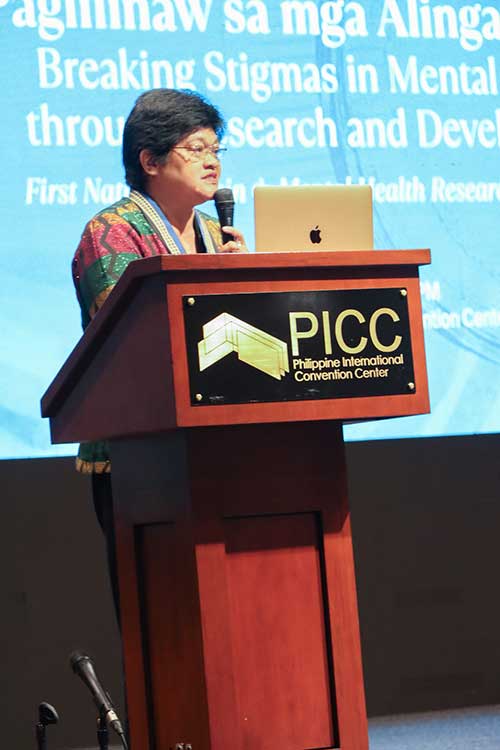
By Joseph Bernard A. Marzan
A 2021-2022 study revealed various mental health issues among Overseas Filipino Workers (OFWs) exacerbated by conditions during the COVID-19 pandemic.
Dr. Veronica Ramirez, an associate professor at the University of Asia and the Pacific, reported on April 11 that disorders identified among OFWs included anxiety, depression, schizophrenia, bipolar disorder, paranoia, panic attacks, fear, and distress.
Ramirez indicated stressors such as pandemic effects, isolation, economic pressures, and challenges during employment, like cultural adjustments and employer maltreatment.
Significant Post-Traumatic Stress Disorder (PTSD) cases were noted among OFWs in Macau’s Special Administrative Region, Qatar, Indonesia, Nepal, and mainland China, affecting 25% in Macau.
“They described a mix of symptoms such as crying, low mood, confusion and anxiousness, feelings of helplessness, guilt, sadness and frustration, concentration difficulties, social withdrawal, restlessness and weakness, changes in appetite, and sleeping difficulties,” Ramirez explained.
Ramirez emphasized the stress related to OFWs’ aspirations of lifting their families from poverty and concerns over personal and familial health. The steps taken to improve economic status often lead to mental health decline.
“They leave for employment overseas to live their family out of poverty, and when they become hopeless, they have mental health problems,” she said.
“Loans, utang, when going [overseas], while there, and going back, because they have to leave money for their family left behind. Loans during overseas employment to send remittances. And some of them even after contract work come home to still pay for their loans,” she explained further.
Workplace environment, job content, organizational conditions, and personal factors like love issues and challenges in discerning misinformation online were also highlighted as stressors.
“After [the] pandemic, Saudi Arabia started to receive OFWs again, but I was told that after 2 to 3 months, the OFWs wanted to come home because of their inability to adjust to culture,” she narrated.
Ramirez also mentioned personal conditions including love problems and their lack of literacy when it comes to accessing social media.
“Many OFWs cannot detect fake news. Phone calls from families, we think, can relieve them, but if it’s always about problems and needs of the family, these can cause mental stress,” she explained.
When it comes to the treatment of these mental health problems, the study found that there was no significant distinction between that of OFWs and non-OFWs.
“For the OFW returnees, triage is done to determine priority cases, then they are referred to the psychiatry section. For those employed, teleconsultation or telepsychiatry are available, as well as consultation at the local health facility,” she said.
The study criticized the Pre-Employment Medical Evaluation (PEME), focused on psychiatric conditions since 1997, for lacking emotional intelligence assessments. Disorders like anxiety, which develop during employment, remain undetected pre-departure.
“It should be noted though, that anxiety disorder for example, happens during employment overseas, and could not be detected during pre-employment,” she remarked.
Ramirez also pointed to health-seeking behavior issues among female OFWs, compounded by immigration status concerns, lack of insurance, language barriers, or discrimination fears.
Other deterrents included financial constraints due to high costs of service, precarious employment conditions, stigma with associated fear of negative judgment, sense of shame, embarrassment, and being a disgrace, fear of being labeled ‘crazy’, self-blame, and concern for ‘loss of face’, social stigma that puts the family’s reputation at stake or places one’s cultural group in a bad light.
“Aside from the inability to recognize it, admitting the condition to one’s self is another problem. In most cases, seeking professional help is sought only as the last resort, because they are more inclined to getting help from family and friends or lay network,” Ramirez described.
“As they do not want to burden other people, they resort to alternative medicines, self-medication, and social vulnerability. There are also unscientific practices such as seeking help from traditional healers or relying on God for healing,” she added.
The research titled ‘Safe Ka ba Sis’, funded by the Department of Science and Technology-Philippine Council on Health Research and Development (DOST-PCHRD), was done with 884 OFWs (80 percent women) surveyed during the pre-employment, deployment, and return stages.
These OFWs hailed from 6 Philippine regions where OFW employment is the biggest, and worked in 10 countries across Asia, Europe, and the Middle East.




















